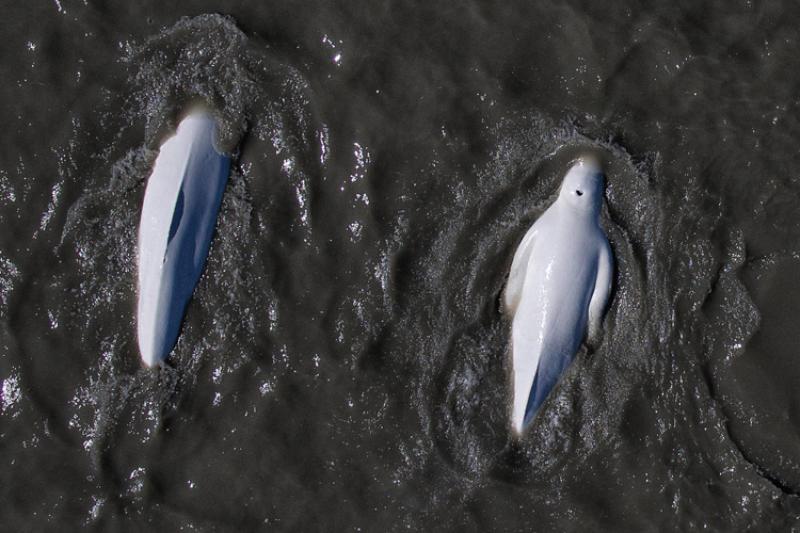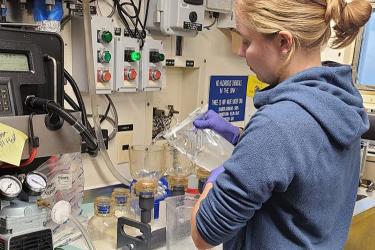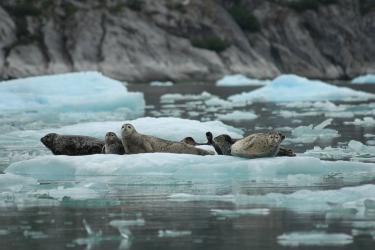
NOAA Fisheries Deputy Regional Administrator for the Alaska Region Doug Mecum, Species in the Spotlight Recovery Hero Award recipient Chris Garner, and Col. George T.M. Dietrich III, Commander JBER and 673rd Air Wing Base. April 6, 2017.
Anchorage, AK—NOAA Fisheries presented the Species in the Spotlight Recovery Hero Award to Joint Base Elmendorf-Richardson’s Cook Inlet beluga conservation program team on April 6, 2017. The team is part of the 673rd Air Base Wing Environmental Element, Natural Resources Section. It is the first time NOAA has awarded the honor in Alaska.
A special ceremony was held at the Arctic Warrior Event Center, with special recognition to team members Chris Garner, Christie Osburn, and Richard Graham.
In 2015, NOAA kicked off a concerted agency-wide effort called Species in the Spotlight to draw upon the power of partnerships to focus recovery efforts on eight marine species most at risk of extinction, including Alaska’s iconic Cook Inlet beluga whale.
“JBER’s Cook Inlet beluga conservation program epitomizes the cooperative spirit of the NOAA Fisheries’ Species in the Spotlight initiative,” said Doug Mecum, deputy regional administrator of NOAA Fisheries Alaska Region. “The team proactively conducts beluga research and conservation activities, and consistently partners, collaborates, and assists with other programs, towards a goal of recovering the endangered Cook Inlet beluga whale population.”
“We have conducted multiple projects, beginning back in the ‘80s with JBER biologists flying surveys,” said Recovery Hero Award recipient Chris Garner, a biologist assigned to the 673d Civil Engineer Squadron. “We gladly accept this award and do so with the full realization there was a whole group of people who helped us get to this point.”
The JBER team is recognized for their efforts targeted at promoting Cook Inlet beluga whale recovery and helping to implement the goals of the Species in the Spotlight Action Plan for Cook Inlet beluga whales. For example, JBER has:
- Conducted a long term Cook Inlet beluga monitoring study in Eagle River and Eagle Bay;
- Partnered with the Cook Inlet beluga acoustics group to record and detect belugas using underwater passive acoustic monitoring devices;
- Contributed resources integral to successful implementation of the 2016 Cook Inlet Beluga Biopsy Feasibility Study;
- Shared data with the Cook Inlet Beluga Photo-ID Project and NOAA Fisheries’ Cook Inlet Beluga Scientific Sightings Mapper;
- Helped ensure availability of prey for Cook Inlet beluga whales by eradicating predatory northern pike in salmon-bearing waterways on JBER lands;
- Participated in stranding response activities adjacent to JBER; and
- Organized trainings for other beluga researchers to access military lands.
Because of JBER’s important contributions to marine mammal science, we are in an improved position to recover the Cook Inlet beluga population.
Cook Inlet belugas were listed under the Endangered Species Act in 2008. Today, they number about 340. NOAA Fisheries recently completed a recovery plan for the species.



